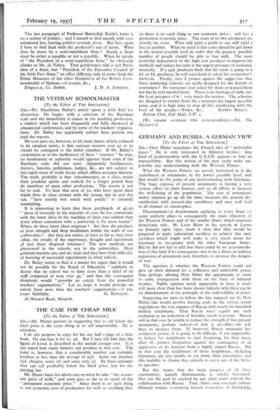• THE CASE FOR CHEAP MILK
[To the Editor of THE SPECTATOR.]
Si,—Mr. Muntz persists in suggesting that to sell below the fixed price is the same thing as to sell unprofitably. He is mistaken.
I do not propose to copy for his use half a page of a blue book. He can buy it for is. 3d. But I may tell him that the figure of 6.01d. is described as the annual average cost. It is not stated how many farmers can produce at that cost. The point is, however, that a considerable number can certainly produce at less than the average of 9/cl. Some can produce 3/d. cheaper, some 2d. and some only id. By those amounts they can sell" profitably below the fixed price, but for the existing law.
Mr. Muntz bases his whole case on what he calls "the econo- mic price of milk," and even goes so far as to speak of the "permanent economic price." Since there is no such thing as one economic cost of production for milk or anything else, so there is no such thing as one economic price ; still less a permanent economic price. The costs of no two producers are exactly the same. What will yield a profit to one will yield a loss to another. What we need is that costs should be got down to the lowest possible level in order that the greatest possible number of people should be able to buy milk. The most powerful inducement to the high cost producer to improve his methods and reduce his costs is the urgent pressure of economic necessity. If a 9/d. producer finds that his trade is going to a 6d. or 8d. producer, he will soon learn to adopt his competitor's methods. Finally, may I protest against the sugge1.1on that these marketing schemes are really designed for the benefit of consumers ? No consumer ever asked for them or wanted them nor has he ever needed them. There is no shortage of milk, nor the least prospect of it : very much the reverse. The schemes are designed to extract from the c3nsumers the largest possible price, and it is high time to stop all this monkeying with the food of the people.—Yours, &c., ALFRED BEESLY. Reform Club, Pall Mail, S.W. r.
[We cannot continue this correspondence.—ED. The Spectator.]














































 Previous page
Previous page